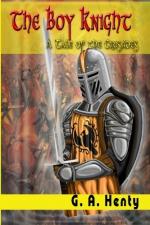Cuthbert, retiring to his tent with the Earl of Evesham, inquired of him what had taken place during his absence.
“For,” he said, “although but a short three days’ march from here, I have been as one of the dead, and have heard nothing whatever of what has taken place.”
“Nothing could have gone worse,” the earl said. “We have had nothing but dissensions and quarrels. First, the king fell out with the Archduke of Austria.”
“On what ground did this happen?” Cuthbert asked.
“For once,” the earl said, “the king our master was wholly in the wrong, which is not generally the case. We had just taken Ascalon, and were hard at work fortifying the place. King Richard with his usual zeal, in order to encourage the army, seized heavy stones and himself bore them into their place. The archduke stood near with some of his knights: and it may be that the haughty Austrian looked somewhat superciliously at our king thus laboring.
“‘Why do you not make a show of helping?’ King Richard said, going up to him. ’It would encourage the men, and show that the labor upon which we are engaged can be undertaken by all without derogation.’
“To this the archduke replied:
“‘I am not the son of a mason!’
“Whereupon Richard, whose blood no doubt had been excited by the air of the Austrian, struck him with his hand a fierce blow across the face. We nearly betook ourselves to our swords on both sides; but King Richard himself could have scattered half the Austrians, and these, knowing that against his impetuous valor they could do nothing, simply withdrew from our camp, and sailed the next day for home. Then the king, in order to conciliate some at least of his allies, conferred the crown of Jerusalem upon Conrad of Montferat. No sooner had he done this than Conrad was mysteriously wounded. By whom it was done none knew. Some say that it was by emissaries of the Old Man of the Mountain. Others affirm that it was the jealousy of some of the knights of the holy orders. But be that as it may, he died. Some of the French, ever jealous of the valor of our king, ascribed it to his orders. This monstrous accusation coming to the ears of King Richard, he had hot words with the Duke of Burgundy. In this I blame him not, for it is beyond all reason that a man like the king, whose faults, such as they are, arise from too much openness, and from the want of concealment of such dislikes as he may have, should resort to poison to free himself of a man whom he himself had but a day or two before appointed King of Jerusalem. However it be, the consequences were most unfortunate, for the result of the quarrel was that the Duke of Burgundy and his Frenchmen followed the example of the Austrians, and we were left alone. Before this we had marched upon Jerusalem. But the weather had been so bad, and our train was so insufficient to carry the engines of war, that we had been forced to fall back again. King Richard again advanced, and with much toil we went as far as the village of Bethany.”




